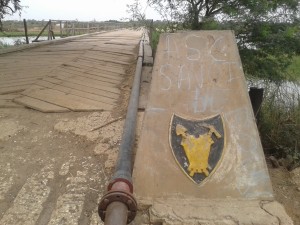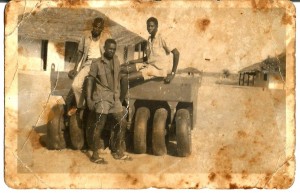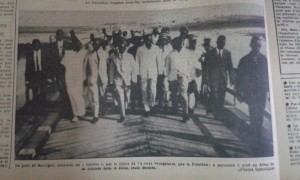In the 1960s, Savoigne was a village-pilote in Senghor’s development policy after Senegal’s independence. It was expected to prompt an innovative agricultural model as well as reducing rural flight. Romain Tiquet recounts the origin and the outcome of this project.
Romain Tiquet is a doctoral student at Humboldt University in Berlin. His research focuses on forced labour and more specifically on the continuities of the policies regarding work and labour from colonial rule until independence in Senegal.
Savoigne, located at nearly 30km north of Saint-Louis, at the heart of the Senegalese River Valley delta, is barely known. Who would have thought that this small village of 2000 souls resulted from the ambitious development plan launched by the Senegalese authorities in the 1960s, right after the independence of the country?
At the occasion of its 51st anniversary which took place on the 11th November 2015, an exploration of Savoigne’s history provides insight into the legacy of Senghor’s policy.
The national army: supporter of Senegalese development
In the aftermath of Senegal’s independence, the promotion of agriculture, the struggle against rural depopulation and the active mobilisation of the youth – 60% of the Senegalese population in the 1960s were under 25 years old – were at the core of Senegalese development ideology. It is in this context that the national army, embodied by its Chief of staff (Chef d’état major) the General Jean Alfred Diallo, suggested in 1964 to launch a village-pilote in the vicinity of Saint-Louis. The main goal of this initiative was to recruit around a hundred of young pioneers in order to educate them on three particular subjects: agriculture, civic and the military.
On paper, the project appears ambitious: a chantier-école (school project) established in the area of Savoigne, organised and overseen by the Senegalese army. After two years of training, the chantier-école mutated into a cooperative village with respect to the rural activities policy (animation rurale), the cornerstone of the development program led by Léopold Sédar Senghor at that time. The pioneers then became owners of agricultural lands and were committed to settle down and develop local agriculture.
In October 1964, a call for recruitment was published in Dakar-Matin, a pro-government newspaper. The state and the army were looking for young single men, between 16 and 20 years old, who were motivated to join the Savoigne experience. The leitmotiv is clear: “Becoming a useful citizen, able to insure its individual destiny”. 150 pioneers were recruited, mainly from the Podor area in northern Senegal, a region stroke by a severe drought since the beginning of the 1960s. The young recruits arrived in Savoigne on 11th November 1964, where more than 500 hectares of land awaited to be cultivated.
Daily life of the barrack
A military discipline reigned on the camp which was led by a Senegalese lieutenant and two warrants officers. The chantier-école was divided into three sections of fifty pioneers and was supervised by three sergeants.
Malick Bâ, a former recruit who now lives at the entry to the village of Savoigne, recalls that the daily routine at the camp was as regular as clockwork. Rise before dawn, at 6am, to water the plants; then jogging and exercises between 7am and 8am before gathering in the camp square for a call-up before the Senegalese flag.
The bridge, janvier 2015 ©Romain Tiquet
After a quick breakfast, the young pioneers were divided into different groups (for agricultural activities, public works, camp logistics etc.) until late afternoon. Finally, the day would end with a few hours of literacy classes until nightfall.
Alternate weekends were free for the pioneers. Permissions were eagerly awaited by the recruits because they could change into civilian clothes and spend the weekend in St-Louis, wandering in the city and enjoying the pleasures of the city for a few hours. Some photographs found in Savoigne testify these moments and show the young pioneers with sunglasses, open shirts and accompanied by young ladies.
The pioneers group ©Ahmedou Touré
“Relying on their own forces”: the pioneers get to work
The chantier-école launched in Savoigne focuses its activities on public works (roads, wells and bridges) and agricultural sites. One of the major construction works undertaken by the young recruits was without doubt the construction of a bridge across the Lampsar, supporting more than 15 tons. Despite the death of a young man who drowned during the construction, the bridge was inaugurated by Léopold Sédar Senghor, the Senegalese President, in July 1965.
Inauguration of the bridge, 1965 ©journal Dakar-Matin
The results of the village-pilote with regards to agricultural production are significant. Savoigne is located in an area surrounded by numerous backwaters, favourable to cultivation. All in all, the pioneers dug more than 11km of seawall and harvested several tons of paddy rice, tomatoes, potatoes and fruits (mainly pineapple and bananas).
Under the cooperation agreements ratified by France – the former colonial authority – and Senegal – the newly independent state –, a French agricultural engineer was sent to Savoigne in order to teach the pioneers how to grow and harvest the lands. His name was Erwan Le menn. He stayed for one year and is remembered, even today in the village, with positively. Alioune Diaye, a former pioneer who still lives in Savoigne, recalls that the young recruits of the camp decided to name the dog of Savoigne “Le menn” when the engineer left.
From the chantier-école to an autonomous village
According to the terms of the agreement made between the Senegalese army and the pioneers, the camp was meant to evolve as an autonomous village on 11th November 1966, two years after the beginning of the project. Theoretically, land plots were to be given to the pioneers who were committed to stay in the village in order for them to cultivate the lands.
Nevertheless, after two years of experience, Senegalese authorities considered that an evolution to autonomy was still a bit premature. Houses were not completely built yet, agricultural training remained basic and many pioneers were still too young to be left alone in the village.
On 7th November 1966, one week before the expected emancipation of the chantier-école from the army, the chief of the camp informed the pioneers that military supervision would be extended for one year. The reaction of the recruits happened almost immediately. They felt betrayed since this decision did not respect the initial agreement. After a consultation of all the recruits, 60 declared their readiness to remain on site and to continue the experience, 40 wanted to get advice from their parents, and more than 50 demanded immediate autonomy for the village.
It came as an outrage to the pioneers. A protest movement was organised and the recruits refused to go to work. On the night of 7th November 1966, many cultivation plots were sacked. Eventually, more than 50 pioneers left the camp, and those who stayed like Alioune Diaye or Seydou Dia, the current chief of Savoigne, were disappointed but still hoped to receive the crop plots as promised by the State.And indeed, in November 1967, the chantier-école became an autonomous village and the first chief of village, Abdoulaye Sarr, was appointed.
Reasons for the failure of the Savoigne project: disconnected policy and conflict of generations
According to the former recruits, to Erwan Le menn [1] and to the archival records, the reasons for this outcome were the recruitment of underage pioneers, the lack of a logistical and financial organisation of the chantier-école, and the political neglect from the Senegalese state.
Furthermore, the tensions which appeared in the camp also resulted from a misunderstanding between the pioneers and the authorities regarding the initial objectives of the project. On the one hand, the experience of Savoigne was supposed to play an important role in the promotion of agricultural activities and in reducing rural exodus. On the other hand, many recruits thought that the education acquired in Savoigne would act as a stepping stone to leave the countryside and give them job opportunities in the large cities of the country (mainly Dakar and Saint-Louis).
Moreover, conflict of generations is at the core of Savoigne’s dynamic and representative of the period. Fearing a significant influx of young and unemployed men in urban centres, the Senegalese authorities criticised the so-called individualism of the young people attracted by the urban way of life rather than by working collectively in rural zones: “How not to be worried by the depopulation of our land in favour of cities! Are the educated young people ready to escape a society tending to individualism?”[2]
Fifty years after the end of the project, the memory of the experience of Savoigne remains strong. Right after the liberation of the camp, the former recruits decided to stay in contact and created an association to keep the memory of this original experience alive. The association is still active nowadays and organises a gathering each year. In November 2014, dozens of former pioneers, spread all around West Africa, travelled to Savoigne to celebrate the 50th anniversary of the village.
[1] Several interviews have been conducted in Savoigne with a dozen of former pioneers still leaving in Savoigne in January 2015. I exchanged a few emails and telephone calls with Erwann Le menn since 2013.
[2] Bâ Abdoulaye, « Du camp de jeunesse au chantier-école du Service Civique : une expérience originale qui mérite d’être soutenue moralement et financièrement », Dakar-Matin, 17 May 1966.



